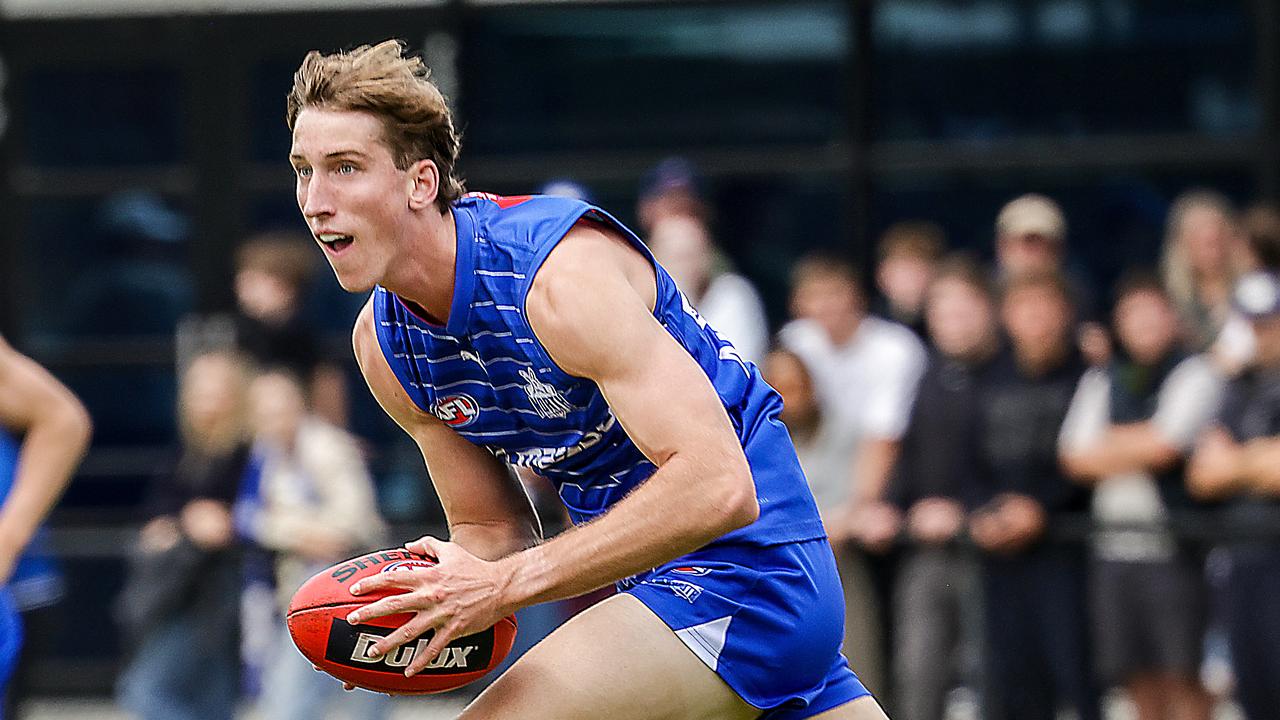Who is new AFL boss Andrew Dillon? The incredible rise of the game’s next CEO
Andrew Dillon first walked through the AFL offices in August, 2000 – three months after a young Gillon McLachlan. The two would go on to shape the future of the game for generations.
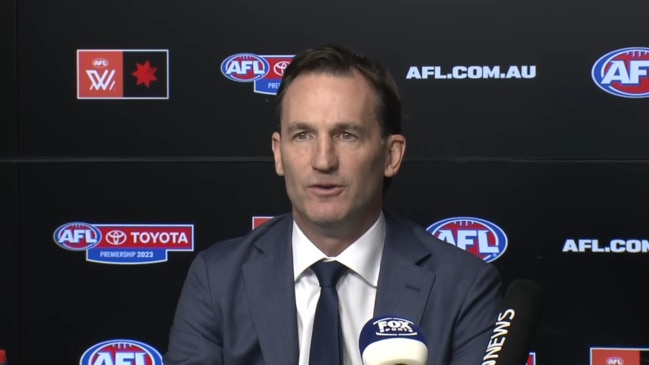
Andrew Dillon was driving home from a game of footy at the MCG when his life suddenly changed direction.
It was the middle of 2000 and the young legal eagle had spent his weekdays for the previous three years working on property trusts and contracts for Village Roadshow’s theme parks and cinema exhibitions, and spent the weekends fortifying his reputation as a revered champion in the Victorian Amateur Football Association.
So when Dillon fleetingly saw his 1995 Old Xaverians premiership teammate and AFL administrator Ben Buckley on Punt Rd that day it was a nod to one of those powerful VAFA links that seemingly sprout tentacles anywhere.
“(Dillon) joined the AFL’s commercial operations team and from memory it was a result of me running into him, or him literally running me over, after a game of footy,” Buckley said.
“Susan Harper, who is one of the senior execs at (talent management agency) TLA, had left the AFL and we were looking for an in-house counsel.
“I yelled out to him, because we’d played footy together, and said: ‘You’re a lawyer aren’t you, Dills?’
“One thing led to another and he joined the team.”
Back in 2000 the AFL bore a stronger resemblance to the VAFA than the billion-dollar beast it is today.
The league had roughly 70 employees, who were housed in the bowels of the southern stand at the MCG.
Dillon first walked through those modest office doors in August, 2000 – three months after a 26-year-old Gillon McLachlan had started as strategic planner.
That year St Kilda chased Fraser Gehrig and Sydney circled Paul Williams – but it was two unheralded signings by head office that would go on to shape the future of Australian rules for generations.
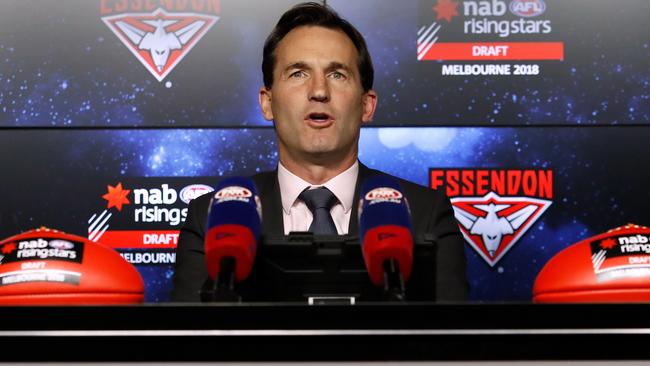
‘DURABLE, RELIABLE AND COURAGEOUS’: THE VAFA STAR
DILLON’S champion playing career in the VAFA was etched in history books before his career at AFL House took flight.
In 1989 he won Old Xavier’s under-19 best-and-fairest and in 1991 he won the reserves best-and-fairest.
In 1992 he was coached in the seniors by Grant Thomas, who likened the back pocket’s toughness to Carlton legend Ken Hunter.
“Dills exemplified the true essence of football toughness – beating his opponent, being uncompromising at the footy, taking his turn, running back into packs and tackling,” Thomas said.
“He was tough in that regard – but I don’t think I ever saw him hit anyone or get reported. He was a very, very clean player.
“He was also one of the very smart guys who realised that the amateur by name, amateur by nature (approach) wasn’t going to deliver them the success they were craving.”
Dillon played 290 games and starred in six-straight A-Grade premierships from 1995-2000, securing his final flag a few weeks after starting at the AFL.
You suspect those cravings were satisfied.
Dillon was as durable as a diamond. Former coach and captain Matt Hannebery, the father of Sydney’s three-time All-Australian Dan Hannebery, recalled the only games he missed were because of travel commitments rather than injuries.
The left-footer, who often wore long sleeves as he minded the resting rover in the back pocket, built his career on reliability.
“He was an excellent player,” Hannebery said.
“He was tight, really durable, reliable and courageous, and very, very coachable.
“I never heard a peep out of him. He left all of the talking to others, so he was very respectful and didn’t gob off.”
On grand final day in 2000 the Amateur Footballer’s (VAFA record) profile read: “No. 41 – Andrew Dillon ‘Father Time’ of Amateur footy. State player. Reliable and honest, despite working as a solicitor with the AFL.”
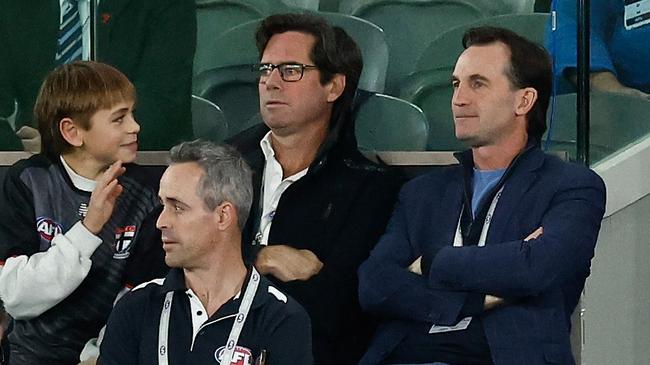
THE PROMOTIONS BEHIND DILLON’S RISE
DILLON once said his appointment as the AFL’s first in-house counsel in 2000 resulted in less fees going to Jeff Browne’s firm.
The current Collingwood president had long been the league’s external lawyer, and Browne helped Dillon slide his feet under the desk.
“(Browne) was great,” Dillon once told the Lives in the Law podcast.
“He taught me all the things about the rules and regulations and even just the way sort of the politics of the AFL and how that all worked, as well as being unbelievably commercially astute. There was definitely a few things I learned from him.”
As Dillon got to work with Buckley on sponsorship contracts and licencing agreements it dawned on the AFL that it had unearthed a rising star.
“We quickly worked out that he was underutilised at the AFL just working in the commercial operations team,” Buckley said.
“I think he went to work in (chief financial officer) Ian Anderson’s team, and ultimately moved up to being the chief counsel across the organisation.
“He came in at a relatively mid-level position, but quickly was the go-to guy if you needed to sort things out.
“He was very good at working between the executives and working with Jeff and his team at Browne and Co.
“The more he grew the more tasks he got given because he had this great ability to get stuff done without any fuss or nonsense.”
Dillon’s run of VAFA premierships foreshadowed his run of AFL promotions — general manager of legal and business affairs (2004), general manager of national and international development and general counsel (2011), general manager of legal, integrity and compliance (2013) and game development (2017).
He is currently executive general manager of football operations, legal and integrity, as well as general counsel.
He has done just about everything and if you ask anyone at AFL House they’ll tell you he’s had input on every key decision for quite some time.
Dillon has written many of the game’s rules – for example, the document explaining the restrictions on trading of future draft picks states: “This is a determination of the General Counsel (Dillon) under Rule 9.3” and has his signature at the bottom.
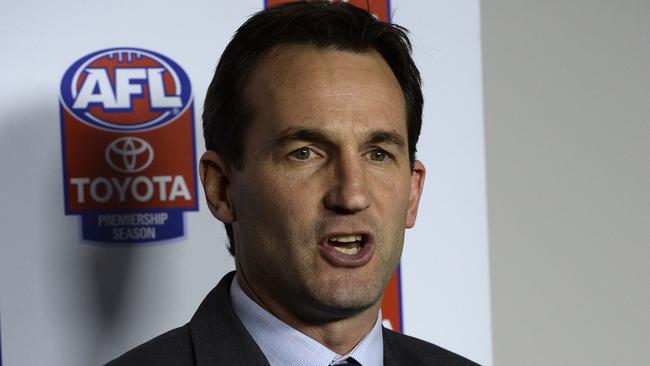
LAWYERS AND PRIESTS: INSIDE THE DILLON FAMILY
DILLON has integrity in his blood.
His grandfather, John Dillon, was appointed Victoria’s first ombudsman in 1973 and in 1980 the monarch knighted him Sir John Dillon for distinguished public service.
Andrew’s father was also named John Dillon and was prominent in Victoria. The lawyer was elected the VAFA’s eighth president in 1984 – the apple doesn’t fall far from the tree – and in 2002 he was named chairman of the Melbourne Racing Club.
It’s a family tree branched with benevolence. Two of Andrew’s uncles are well-known family priests – Brendan Dillon and Kevin Dillon, the former St Mary’s Catholic Parish Priest of 16 years.
In 1992, Brendan was appointed chaplain of the racing fraternity and he would annually bless racetracks and jockeys as well as preside over a pre-Melbourne Cup Sunday mass at Saint Francis’ Church in the city.
The Dillon men are known for their love of horse racing, a beer and community. It’s understood that Racing Victoria attempted to poach Andrew Dillon and make him chief executive in 2017.
Dillon was one of six kids (two girls, four boys) and younger brother Rob once backed 1986 Caulfield Guineas winner Abaridy at $251 … as an eight-year-old.
That hilarious punting memory was one of countless stories beautifully told by Andrew Dillon in his eulogy for Rob, who died of rhabdomyosarcoma cancer in 2022, aged 44.
It was a heart-warming 20 minutes on a heartbreaking day and the mourners at Richmond’s St Ignatius Catholic Church were heard laughing as Dillon celebrated the life of his younger brother.
Dillon on Monday paid tribute to his late brother.
“To my younger brother Robbie, who is sadly no longer with us,” Dillon said.
“I hope you’re looking down on us all today and you’re feeling proud, and I hope you’re not too despondent about the Tigers being beaten by Gold Coast yesterday.”
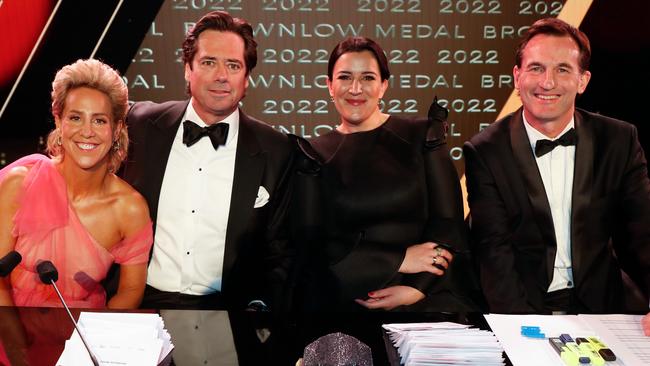
THE BOYS’ CLUB PERCEPTION
THE AFL detests the perception it runs a boys’ club and on the surface Dillon might seem like he fits that culture.
But don’t be fooled by his family’s fondness of horse racing and a beer. Dillon is a staunch family man – he and wife Amanda have three girls (Lucy, 21, Pippa, 20 and Chloe, 17) – who has avoided making mistakes.
“Even looking back, if there was trouble he seemed to never be in it,” Hannebery said.
“He was smart enough to avoid it. There’d be plenty of other young blokes carrying on and making noise, but he seemed to always be able to avoid it
“Dills was one of those guys who seemed to be able to have fun and be one of the lads, but he was also exceptionally intelligent.”
Nowadays Dillon goes above and beyond outside of his AFL commitments.
Last month he attended the VFL season launch and farewell drinks for AFL media workers Aaron Pereira, Don Mayes and Nicole Melbourne.
He spoke to ex-players before the healing ceremony at Victoria Park on the 30th anniversary of Nicky Winmar’s “I’m black and I’m proud” moment.
Dillon’s been on the board at Fight MnD, Champion Data, Aardvark Music, the Bachar Houli and Michael Long foundations and the AFL Gippsland Commission.
He’s even a trusted sounding board for club powerbrokers.
“A lot of people in the industry have picked up the phone from time to time, rang Dills and said, ‘What do you think about this?’ Or, ‘How would you approach that?’” Buckley said.
“That says a lot about his character, and that’s why he’s got such respect across the industry because he’s considered, calm and provides very, very sound advice.
“I know when I was (North Melbourne) president I would call him and get his views on things. He would never compromise his obligations, but he would always be good to bounce thoughts off.
“You knew you’d get a very straight answer, but in a very considered, pragmatic way.”
Dillon’s knack of staying rational instead of emotional helped Hawthorn president Andy Gowers when he was coaching Old Xavs in 2012.
Gowers wasn’t impressed when his team clung on for a scrappy win after shooting to a big lead.
“I was quite worried about the signs in the second half and (assistant coach) Dillon rang me and said, ‘Look, if you’d been offered a three-goal win before the game you would’ve taken it,” Gowers said.
“Sometimes we can read too much into falling away. We got the win and we should focus on that.
“It was a good reminder and it sums Andrew Dillon up – he’s a common sense guy.”
Dillon’s intellect has been a constant.
He excelled at maths and science at school before pursuing a bachelor of commerce and a bachelor of laws from the University of Melbourne and a post-graduate diploma in applied finance and investment from the Securities Institute of Australia.
“He was quite a good student. He might have been dux at the school every year except year 12,” Hannebery said.
Dillon would often pick up spelling mistakes in another coach’s training notes.
Colleagues at AFL House are often amazed at how Dillon’s sharp memory saves them time because he can recall intricate details from meetings and projects across his 24 years.
As one family friend noted: “When you spend time with him he often does more listening then talking – but if you want him to talk on something he’ll tend to know more than you.”
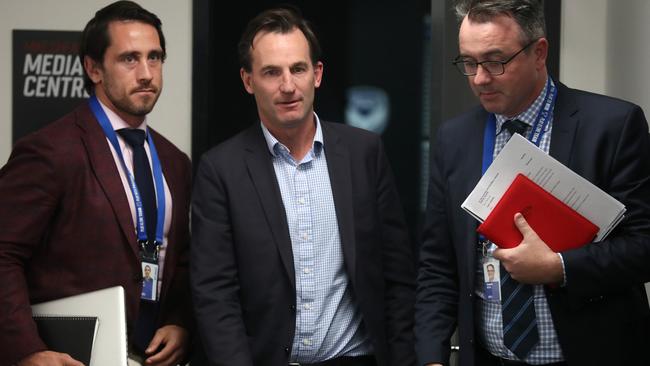
WILL DILLON BRING ABOUT CHANGE?
THOMAS has long been a staunch critic of the AFL. But in Dillon he sees a change of temperature that can restore faith in the game.
“The dilemma the AFL has at this point in time is a lot of frustration by a lot of different interest groups, being supporters, members, sponsors, media,” Thomas said.
“Everyone has that doubt around integrity, has that doubt around transparency, has that doubt around control, and brand protection and all those things, which is ugly, and distasteful, and frustrates the living hell out of all of us.
“The thing that I see Andrew Dillon bringing to the table is he mitigates a lot of that.
“To me he is a person of high integrity, he’s transparent, he won’t cover up and he won’t lie in my view.
“So I would have a high degree of comfort of all of those components that I think the AFL has lacked.
“They will fall over themselves to improve their brand or protect themselves for their misgivings.
“It’s OK to say, ‘We made a mistake, we did wrong’. But they don’t do that, and I think that Andrew Dillon is a person that has extremely high integrity in those areas.”
THE WORLD’S EASIEST – AND LONGEST – GAME OF WHERE’S WALLY
It took the AFL Commission 13 months to settle on Dillon as McLachlan’s successor, and the sluggish timeline further alienated AFL Commission chairman Richard Goyder from clubs.
The exhaustive process was opened up to AFL executives including Travis Auld and Kylie Rogers and club bosses including Brendon Gale (Richmond), Dave Matthews (GWS), Tom Harley (Sydney) and Simon Garlick (Fremantle).
The AFL spent close to $1 million to ultimately settle on Dillon, the Richmond-supporting lawyer who was first identified by Buckley in a Punt Rd traffic jam.
Insiders laugh at how a global search – advice was even sought from New York-based consultants Spencer Stuart — spanned a few steps down the corridor at AFL House.
Dillon had been McLachlan’s right-hand man at recent executive meetings, always sitting to McLachlan’s right.
It might appear that Goyder’s Commission has staged the world’s easiest – and longest – game of Where’s Wally.
But Walt Disney senior vice-president and Western Bulldogs president Kylie Watson-Wheeler came with such a rush in the past few weeks that for a moment Goyder and his closest confidante on the commission, Paul Bassat, were behind what would’ve been a glass-ceiling moment.
Long-time Collingwood president Eddie McGuire said looking down the corridor instead of scouring the globe was the right decision.
“In the last two years at SportNXT the two key people that I’ve interviewed are Adam Silver from the National Basketball Association (NBA), and Roger Goodell from the National Football League (NFL) – the two most senior executives in world sport,” McGuire said.
“Both of them made the compelling point that while it’s fine to bring people into an organisation, it has worked for them so successfully over the years because they have the DNA, they understand the tone of deals, they understand everyone in every department, they know everyone at every football club, and people have an innate trust for them.
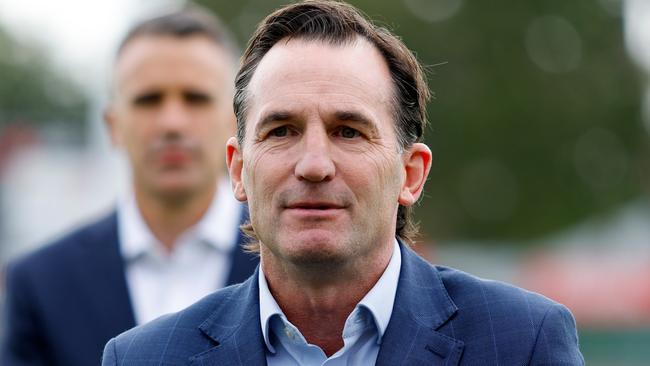
“That doesn’t mean there won’t be controversial (moments) along the way (but) no one in my mind would complain that Andrew Dillon has the job.”
McLachlan has long been seen as the perfect front man. But Dillon is seen as tomorrow’s man.
“Most importantly, the job of a CEO these days is going to be running major issues like concussion, Hawthorn and whatever else comes up – and that’s where he is,” McGuire said.
“The concussion situation needs somebody who understands the law and has been involved and gets it.
“Apart from that, whoever he puts in as head of football, he knows that instinctively. He’s run that department for the best part of however long he’s been there.
“I’ve always found him to be somebody who can look at an issue and adapt to it without just being completely on the railway lines of strategy. He can adapt quickly and understands it from a point of view of fairness.
“And having spoken to both Goodell and Silver, it made perfect sense that Andrew Dillon would be the person to take over. Just as Gill McLachlan did from Andrew Demetriou.
“That’s just so important. Sometimes you’ve got to bring somebody in fresh and it ends up taking them 12 months to work out everyone’s name.
“This is a better way to go. I’d like to think to the AFL is now big enough to actually bring people through, as they’ve been able to do on the last three occasions.
“He knows where everybody is buried and he has a very firm grip on where everything is at the moment so to me it’s a steady baton change.”
The AFL wasn’t a beast when Dillon joined in 2000.
The seven-figure price tag splashed on a largely internal CEO search should emphasise that come October he will be running a billion-dollar industry.
As former Herald Sun chief football writer Mike Sheahan once said: “Running the AFL is similar to being Prime Minister. Except more people care about the AFL.”

